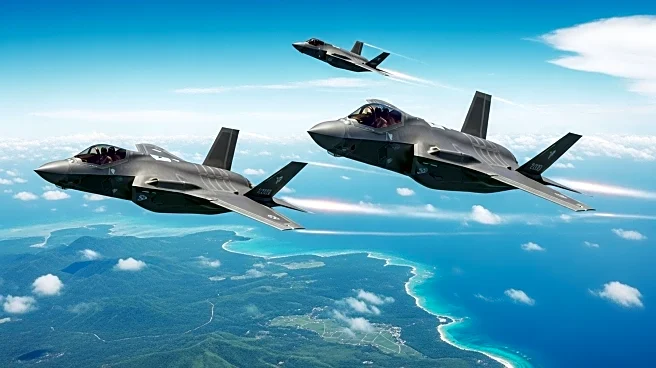What's Happening?
President Trump has ordered the deployment of F-35 fighter jets to Puerto Rico as part of a military operation aimed at combating drug cartels in the Caribbean. This move marks a significant escalation in the U.S. government's efforts to address drug trafficking in the region. The deployment has been reported by various military-focused media outlets and is beginning to gain attention in mainstream U.S. media. The decision to use F-35s, America's most advanced warplanes, highlights the administration's commitment to tackling the issue with substantial military resources. The deployment also coincides with heightened tensions between the U.S. and Venezuela, following an incident where Venezuelan military planes flew over a U.S. naval destroyer. President Trump has threatened to shoot down any Venezuelan aircraft that pose a threat to U.S. forces.
Why It's Important?
The deployment of F-35 jets to Puerto Rico underscores the U.S. government's intensified focus on drug trafficking in the Caribbean, a region that has long been a conduit for illegal narcotics entering the United States. This action could have significant implications for U.S.-Venezuela relations, as it comes amid ongoing tensions and accusations of drug trafficking against the Venezuelan government. The use of advanced military technology in this context raises questions about the potential for military conflict and the broader geopolitical strategy of the Trump administration. The move may also impact U.S. domestic politics, as it aligns with President Trump's tough stance on drug-related issues and his broader foreign policy objectives.
What's Next?
The deployment of F-35s to Puerto Rico is likely to provoke reactions from various stakeholders, including the Venezuelan government, which has vowed to defend its sovereignty. The situation may lead to increased diplomatic tensions and potential military confrontations in the region. Additionally, the U.S. administration may face scrutiny from domestic and international observers regarding the use of military force in addressing drug trafficking. The effectiveness of this strategy in curbing drug flows into the U.S. will be closely monitored, and further military or diplomatic actions may be considered based on the outcomes of this deployment.
Beyond the Headlines
The decision to deploy F-35s in the Caribbean could have long-term implications for U.S. military strategy and foreign policy in Latin America. It highlights the administration's willingness to use advanced military assets in non-traditional roles, such as combating drug trafficking. This approach may set a precedent for future military engagements in the region and influence U.S. relations with other Latin American countries. The deployment also raises ethical and legal questions about the use of military force in addressing transnational criminal activities, which are typically handled through law enforcement and diplomatic channels.










